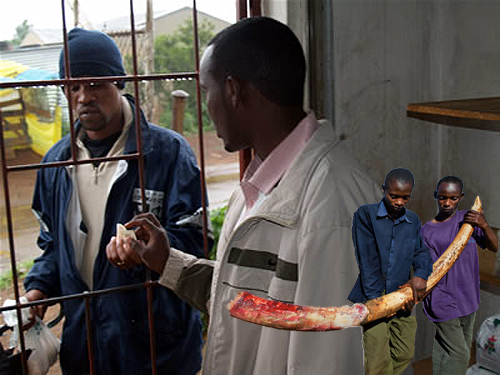 Elephant poaching is increasing, unorganized, ad-hoc and much more likely organized by corrupt Ugandan and Congolese government soldiers than rebels or militia.
Elephant poaching is increasing, unorganized, ad-hoc and much more likely organized by corrupt Ugandan and Congolese government soldiers than rebels or militia.
Although rebels like what’s left of the LRA also poach, they are not the principal poachers. In fact, they probably have an extremely minor role. And news reports suggesting otherwise make it increasingly difficult for us to solve the problem of increased elephant poaching.
So says Kristof Titeca after more than a year of field work in Garamba National Park in The Congo, a young post-doc from Belgium, in an article posted today.
It’s only work and analysis like this, which rarely percolates into the world media, that gives us a handle on how to deal with the current increase in elephant poaching. It’s equally important in suggesting that established news media has more interest in fanning dying embers of scandals than digging for the truth.
Titeca’s research and analysis is about ivory poaching. But he can’t help but wonder why not-for-profits out raising money, like the established world media find it so necessary to make these untrue links:
“One cannot help thinking that these reports are primarily concerned with trying to bring the LRA back into the limelight, in a context where its reduced violence makes it much harder to do so.”
And so Titeca veers slightly from his field work about elephants and ivory to find a couple references showing how diminished the LRA has become. His own work has concluded the same.
News delivery is so entrenched and institutionalized that reality is fixed like photograph. Often today in Africa, you have to turn to young kids outside the media system to get the real story.
There are a few precious sources in established media, and Titeca for example applauds Jeffrey Gettleman of the New York Times. But he doesn’t applaud any NGO or charity organization, and I expect because there aren’t any to applaud.
Titeca’s research is comprehensive. He details the trail from the initial killing to the traders and middleman to the airports that finally export it. Although established media focuses on Dar-es-Salaam and the Kenyan coast of Mombasa as major exit conduits, Titeca’s own research points squarely to Uganda.
As I’ve often written elephant poaching today is totally different from the plague that nearly exterminated the beast in the 1970s and 1980s, but those days gave rise to public awareness and the birth of numerous then good charity organizations.
Those organizations just can’t get it right, this time. In part because their very successful method of helping to end the extermination forty years ago won’t work, today, and they seem incapable of changing their focus.
Back then raising awareness and putting pressure on certain governments successfully led to the creation of CITES and the international ban on trading ivory.
That’s done. And it’s no longer working, because most governments are wholly convinced of the need to ban the ivory trade (even, I sometimes think, China) and because the world is widely aware of all kinds of animal poaching.
As Titeca and so many others point out, the trouble today is small ad-hoc groups of poachers and more organized middlemen, and many, many of them.
The mischievous attempt to put the rap on rogue organizations like the LRA is a terrible distraction and untrue: hard for the public to disconnect because the LRA is so horrible, and hard for CNN because it makes such a good story.
Ivory poaching today in East Africa is hardly different than robbing a 7-11 in the U.S. And it’s on a dangerous increase, yes, but the solutions are much more complicated than when Mama Ngina collaborated with the Emirates and used Sikorsky helicopters over the Serengeti.
The world’s complicated, folks. There’s no solution in your newspaper headline.
I don’t think animal poaching can be stopped when buyers are still given licenses to transact such business.. If we can find away of stopping buyer to licences then we have a solution to stop poaching..